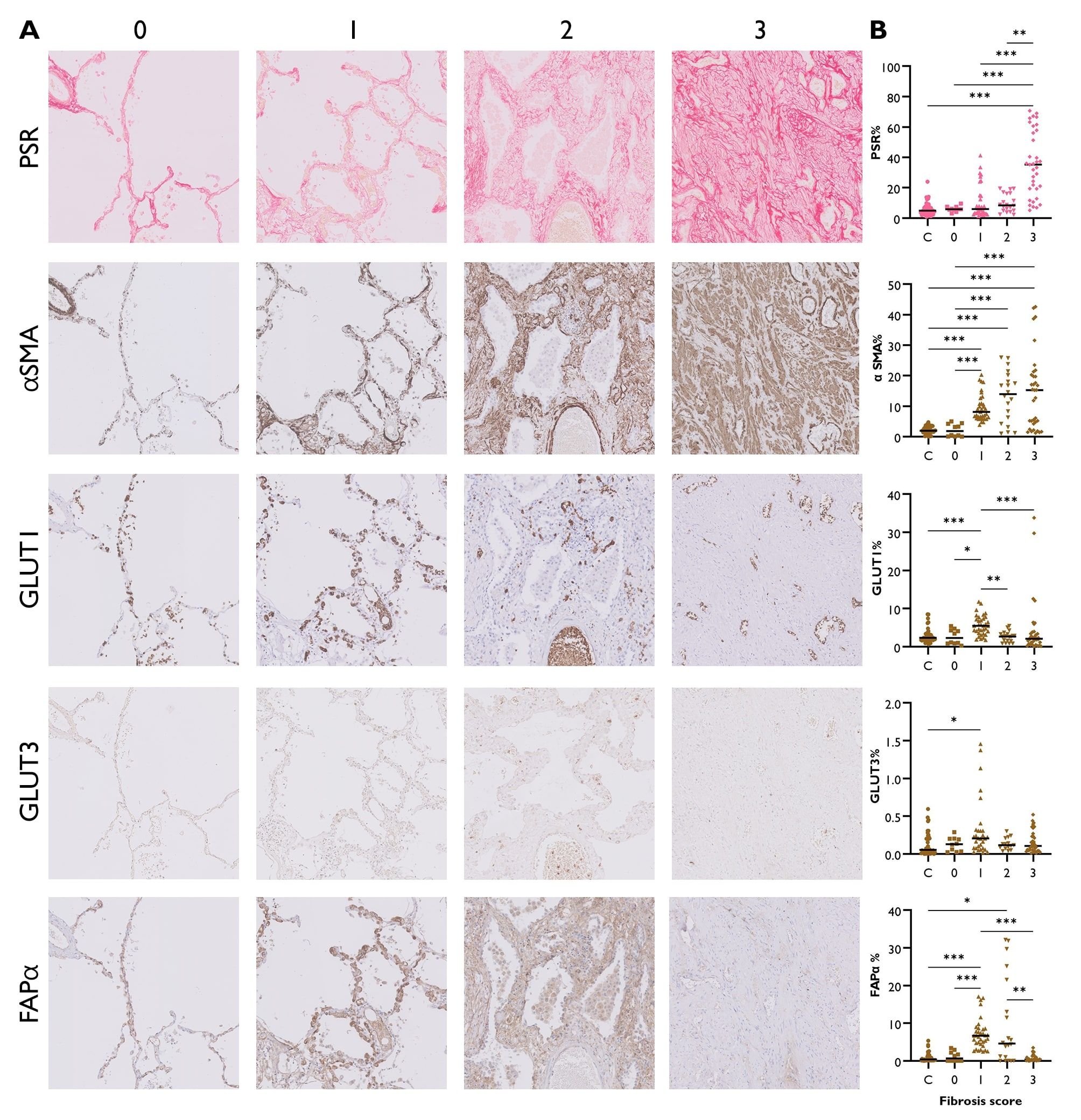Session Information
Date: Tuesday, October 28, 2025
Title: (1855–1876) Systemic Sclerosis & Related Disorders – Basic Science Poster II
Session Type: Poster Session C
Session Time: 10:30AM-12:30PM
Background/Purpose: The clinical management of systemic sclerosis-associated interstitial lung disease (SSc-ILD) is challenging due to its heterogeneous progression. While recent studies have shown that pulmonary uptake of 18F-FDG and 68Ga-FAPI on positron emission tomography (PET) may indicate ILD activity, the spatial distribution of their molecular targets—GLUT1, GLUT3, and FAPα—in SSc-ILD lung tissue is largely unexplored. Here, we investigate the expression patterns of these markers across varying fibrosis stages in lung tissue of SSc-ILD patients and controls to improve PET interpretation.
Methods: Immunohistochemistry for GLUT1, GLUT3, and FAPα was performed on lung tissue from SSc-ILD patients (n=9) and controls (n=8). Fibrosis stage and cell-type-specific expression of these markers were analyzed by 2 experienced ILD pathologists, and quantitative staining was assessed using QuPath software. Marker expression was analyzed in and compared between areas with varying fibrosis stages.
Results: GLUT1 positive cells were primarily erythrocytes, GLUT3 positive cells were mainly myeloid cells and FAPα positive cells were predominantly fibroblasts, endothelial cells, epithelial cells, and macrophages. All cells positive for these markers were significantly more present in SSc-ILD compared to controls, with GLUT1 and FAPα positive cells showing highest prevalence in areas with early signs of fibrosis (Figure 1).
Conclusion: The prevalence of cells expressing GLUT1 and FAPα is increased in areas with early signs of fibrosis and the expression of GLUT1, GLUT3 and FAPα is observed in different cell types suggesting that 18F-FDG and 68Ga-FAPI PET each may be useful to visualize different aspects of ILD activity.
 Figure 1. Expression of GLUT1, GLUT3 and FAPα varies between areas with different stages of fibrosis (0-3) in systemic sclerosis-associated interstitial lung disease.
Figure 1. Expression of GLUT1, GLUT3 and FAPα varies between areas with different stages of fibrosis (0-3) in systemic sclerosis-associated interstitial lung disease.
To cite this abstract in AMA style:
Broens B, van der Laken C, Radonic T, Mulder D, Nossent e, Al-Adwi Y, Gan T, Timens W, Voskuijl A, Duitman J. GLUT and FAPα as molecular imaging markers for interstitial lung disease in systemic sclerosis [abstract]. Arthritis Rheumatol. 2025; 77 (suppl 9). https://acrabstracts.org/abstract/glut-and-fap%ce%b1-as-molecular-imaging-markers-for-interstitial-lung-disease-in-systemic-sclerosis/. Accessed .« Back to ACR Convergence 2025
ACR Meeting Abstracts - https://acrabstracts.org/abstract/glut-and-fap%ce%b1-as-molecular-imaging-markers-for-interstitial-lung-disease-in-systemic-sclerosis/
